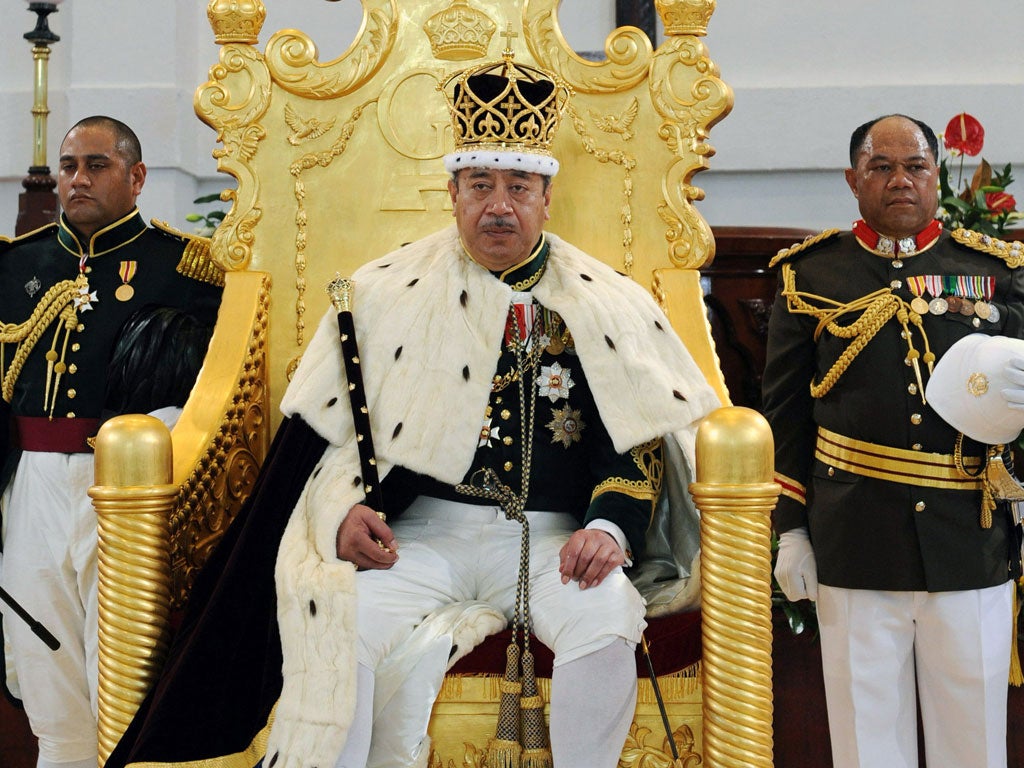King George Tupou V: Reformer who brought democracy to Tonga

Your support helps us to tell the story
From reproductive rights to climate change to Big Tech, The Independent is on the ground when the story is developing. Whether it's investigating the financials of Elon Musk's pro-Trump PAC or producing our latest documentary, 'The A Word', which shines a light on the American women fighting for reproductive rights, we know how important it is to parse out the facts from the messaging.
At such a critical moment in US history, we need reporters on the ground. Your donation allows us to keep sending journalists to speak to both sides of the story.
The Independent is trusted by Americans across the entire political spectrum. And unlike many other quality news outlets, we choose not to lock Americans out of our reporting and analysis with paywalls. We believe quality journalism should be available to everyone, paid for by those who can afford it.
Your support makes all the difference.King George Tupou V of Tonga was widely seen as a reformer who gave up most of his powers in order to usher in a more democratic era to the small South Pacific kingdom of 176 islands with a population of just over 105,000. Seen as an eccentric by many, Tupou loved Savile Row suits and military uniforms, and had a penchant for the dress of Lord Chelmsford's army in the Anglo-Zulu campaign, with spats, pith helmet and brass. He commanded the Tongan Defence Services, which saw service in Iraq and are now in Afghanistan.
Although his reign was short, the colourful, sometimes monocled, King was much loved, even in the most remote villages of the sprawling archipelago, and he left a legacy of radical political reforms, with a constitutional monarchy in place after 165 years of feudal rule. His father, Taufa'ahau Tupou IV, who was on the throne for 40 years, had resisted ceding any power from Tonga's absolute monarchy or acquiescing to demands for democracy, and when he died in September 2006 there were protests at the slow pace of reform, which eventually erupted into a wave of rioting and looting resulting in eight deaths and, despite the deployment of troops, the destruction of much of the central business district of the capital, Nuku'alofa.
Critics accused members of the royal family of enriching themselves through deals with the government and putting millions of pounds in overseas banks. Meanwhile, most of the people lived in poverty as subsistence farmers.
With such a backdrop, Tupou was persuaded to postpone his officialcoronation until 2008, realising the need for reform. He put together a framework for sweeping changes which saw power transfer to a largely democratically elected parliament with the Crown becoming a constitutional monarchy. The King would, however, remain head of state with the right to veto laws, commute sentences and dissolve parliament.
Days after announcing the reforms Tupou was finally crowned at an elaborate and lavish five-day ceremony, attended by 1,000 guests including the Duke and Duchess of Gloucester, the Sultan of Brunei and the then New Zealand Prime Minister Helen Clark. It incorporated tribal rites, with dozens of slaughtered pigs and hundreds of baskets of food given in tribute; the King was offered a bowl of kava, a mildly hallucinogenic drink made from plant roots, to signify his sovereignty over Tonga. All this cost £1.6 million, straining the finances of an already impoverished country.
But in November 2010, Tupou's pledge was made good and the people of Tonga voted for their first popularly elected parliament. Under the new constitution, voters chose representatives for 17 seats, with nine reserved for nobles. On the eve of the vote, Tupou announced that he was giving his executive powers to the cabinet and parliament, saying: "in future the sovereign shall act only on the advice of his Prime Minister". Noble Siale'ataongo Tu'ivakano became Tonga's first democratically elected Prime Minister.
Born Siaosi Taufa'ahau Manumataongo Tuku'aho Tupou in the capital Nuku'alofa in May 1948, George Tupou was the eldest of four sons of Taufa'ahau Tupou IV and Queen Halaevalu Mata'aho. Initially educated in Auckland, New Zealand, Tupou then went to the Leys School, Cambridge, where he got into a few scrapes but "took my punishment like everyone else" before finishing off in Switzerland.
To his surprise he was sent for officer training at Sandhurst, where he excelled in marksmanship and in the classroom. But, he later recalled, he learnt "not to take life too seriously." This was followed by a spell at Oxford University in preparation for a role as Tonga's High Commissioner in London before returning to Tonga as Minister for Foreign Affairs. His latter role enabled his intellect and charm to come to the fore and he became a respected figure on the Commonwealth stage. He retained an immense fondness for Britain.
In his free time, despite the tropical climate, Tupou relished nothing more than wearing Western clothes, adorning elaborate military uniforms and being driven around in his customised London taxi. The choice, he explained, was entirely practical: "An English taxi is extremely easy to get in and out of wearing a sword, a spiked helmet or spurs. I realise these are not primary considerations for buying a car for most people but it is for me." He also enjoyed sailing model boats in his pool, playing computer games, documentary-making and staging Agatha Christie-style murder mysteries.
Tupou died after a short illness, which it is suspected could be related to the removal of a cancerous tumour in 2011. He remained a bachelor but had a daughter. His younger brother, Crown Prince Tupouto'a Lavaka, succeeds him as King.
Martin Childs
Siaosi Taufa'ahau Manumataongo Tuku'aho Tupou (King George Tupou V of Tonga): born Nuku'alofa, Tongatapu, Tonga 4 May 1948; one daughter; died Hong Kong 19 March 2012.
Join our commenting forum
Join thought-provoking conversations, follow other Independent readers and see their replies
Comments